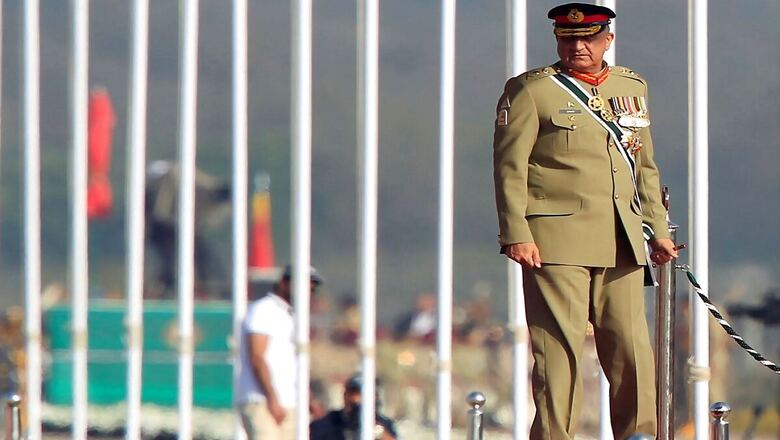
views
“It is a fact that the textbooks cannot mention Hindus without calling them cunning, scheming, deceptive or something equally insulting. Students are taught and made to believe that Pakistan needs strong and aggressive policies against India or else Pakistan will be annihilated by it” – noted a leading Pakistani educationist, Tariq Rahman, about Pakistani literature that spreads hate.
This is precisely the narrative that the Pakistani army seeks to foster, to preserve a preeminent position in the Pakistani polity for itself, supposedly to safeguard the family silver from the “devious Indians”. If any proof is required of their “evil designs” that is provided by the likes of Punjab Textbook Board for secondary classes. It described the cause of the creation of Bangladesh (former East Pakistan) as under (excerpts):
“There were a large number of Hindus in East Pakistan. They had never truly accepted Pakistan. A large number of them were teachers in schools and colleges. They continued creating a negative impression among students–The Hindus sent a substantial part of their earnings to Bharat, thus adversely affecting the economy of the province. Some political leaders encouraged provincialism for selfish gains. They went around depicting the central government and (the then) West Pakistan as enemy and exploiter. Political aims were thus achieved at the cost of national unity.” (The Dawn – What is the most blatant lie taught through Pakistan textbooks?)
That is why Pakistani Army chief General Qamar Javed Bajwa’s peace overture on March 18 took everyone, except a handful of people on both sides who were privy to back channels working overtime, by surprise.
Speaking at the Islamabad Security Dialogue, he conceded that Pakistan had an image problem; that “unsettled disputes are dragging (the South Asian) region back to the swamp of poverty” and that stable India Pak relations were “key to unlocking the untapped potential” which had “forever remained hostage to disputes” between the two nations.
Bajwa termed the Kashmir dispute as the “head of this problem” and emphasised the need for its resolution “through dialogue in a dignified and peaceful manner”. He added that it was “time to bury the past and move forward” by creating a “conducive environment”, particularly in Kashmir. It is worth noting that there was no mention of Article 370 or UN resolutions that Pakistan has traditionally been harping upon.
Earlier on February 25, the Director Generals of Military Operations (DGMOs) of India and Pakistan, had released a joint statement on an agreement to “cease firing along the Line of Control and all other sectors with effect from midnight 24/25 Feb 2021”. Previously a ceasefire was announced in 2003 which held till 2006. The year 2020 saw 5,133 instances of ceasefire violations resulting in a loss of numerous innocent lives of military personnel and civilians. The renewed ceasefire is therefore a welcome development regardless of how long it lasts.
Numerous questions arise about the real motive of Pakistan and reason behind the sudden peace overture. Is the move tactical or strategic? Are the Corps Commanders and jihadi leaders on board? Is it the fear of FATF blacklisting or the imminent economic collapse the clincher? Already in office for five years, has General Bajwa consolidated his position enough to neutralise the domestic detractors? Did China, the US, or UAE play any role in bringing about the thaw? And finally, were bilateral back channels at work?
A leading Western daily had tabulated that between 1947 and 2017 India and Pakistan had gone through 45 rounds of summit-level talks in the quest for a permanent settlement. Indian leaders had time and again taken the initiative to turn a new leaf with Pakistan.
However, the deep state (army, terror network, and intelligence setup) struck back every time, bringing the process to naught. In the bargain Pakistan has been impoverished, truncated, and has become a fountainhead of terrorism. Sectarian violence is rife, the civilian setup has steadily ceded ground and the armed forces have become the arbiter of the country’s fate.
The decline has been precipitated in recent years. Islamabad is now at the sufferance of Beijing for economic survival and for remaining politically relevant. Ties with Saudi Arabia and the UAE, two of its traditional benefactors, have frayed. Eleven opposition parties have joined hands to launch the Pakistan Democratic Movement. For the first time in history, the army is at the receiving end and the crowds are loving it.
Naturally, the military was keen to extricate itself from the hole it had slid into. There have been a number of media reports about Indian and Pakistani national security establishments keeping in contact throughout. This is a global norm for even the strident of adversaries to keep line (s) of communication open. It is this author’s understanding that the role ascribed to the UAE is overstated. Be that as it may, the UAE is regarded as a friend and well-wisher by both countries whose discrete counsel is given due weightage.
India’s response to the peace overture was quick, positive, and cautious – “India desires normal neighbourly relations with Pakistan. We have always maintained that we are committed to addressing issues, if any, in a peaceful bilateral manner.”
India-Pakistan relations have witnessed many a false spring and this too could be one. Though the guns have fallen silent across the LoC, the terror infrastructure remains intact. Are we, therefore, not better off ignoring the olive branch rather than bailing out the Pakistani army? The answer is an unequivocal no. Even if there is the slightest chance of constructing a new architecture or saving a few innocent lives, it is well worth the effort.
India’s sole redline is a terror-free environment. In recent years, we have also demonstrated a political will and ability to take the fight into Pakistan-held territories. These capabilities will only grow over time. Thus, we stand ready to welcome any number of peace overtures by Pakistan, while keeping our guard up and being ready to deal with any eventuality.
Read all the Latest News, Breaking News and Coronavirus News here













Comments
0 comment